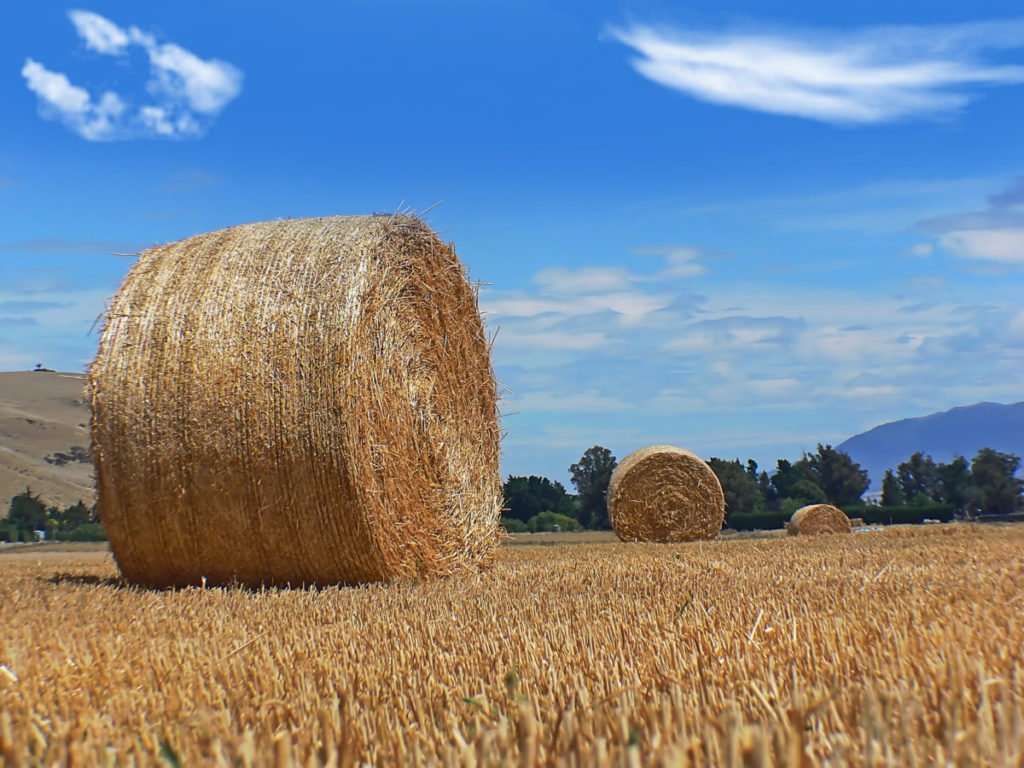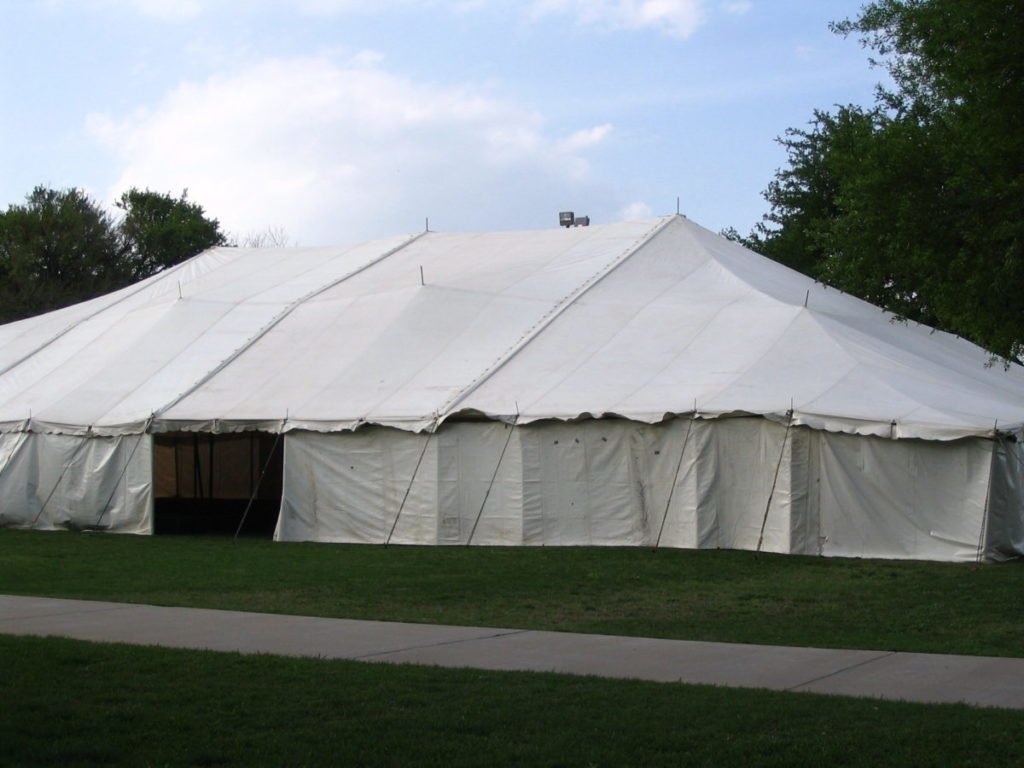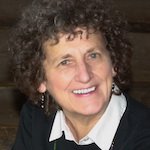Mary Alice Hostetter is an Honorable Mention in Streetlight Magazine‘s 2020 Essay/Memoir Contest
The first thing I noticed was the sign. My mother and I were driving back from getting corn meal at the mill, and we saw it on Leroy’s fence, “Brunk Tent Revival Coming August 15-22.” Leroy’s farm bordered ours.
“Well, I guess that’ll take care of the peace and quiet for a while,” my mother said. “Looks like the show is coming.”

The next week Leroy mowed his hayfield as close as he could cut it, pulling the hay mower back and forth. We saw men cutting an opening in the fence. Tractor trailers pulled in, three of them. The next day they hooked up generators, and volunteers from Mennonite churches all over came to help set up the tent. When we drove by, we saw them unloading sawdust and wood shavings from the sawmill and spreading them under the tent. Volunteers set up hundreds of chairs, assembled the stage, hung lights and unloaded the pulpit. We watched from our farm on the hill—saw the lights when they tested them after dark, heard the hymns when they checked the microphones. Everything was set.
Our town in eastern Pennsylvania was too small for a circus, too small even for a carnival or county fair, not that our parents would have let us spend our time or money on that kind of amusement anyway, so a tent in Leroy’s field was getting a lot of attention. Some at our Mennonite church weren’t sure the tent revivals were a good thing. Others said, with thousands of souls being saved all over, they had to be the Lord’s work. Some weren’t so sure. I didn’t care one way or the other.
“All those cars on Leroy’s field are just going to tear it up,” my father said as he buttered his bread at supper the evening the revivals were to start. “Course I’m sure they’ll make it worth his while, so I don’t think Leroy’ll mind. If you think about it, we have no idea where the money from the offerings goes.”
“No secret where some of it goes,” my mother said. “All those trucks and that big tent can’t be cheap. Just seems a waste, as many churches as there are standing empty every evening. Why would you want to go sit in a field? Seems to me that money could be put to better use.”
My older brother Dale said he wanted to go to the revival on opening night, and I said I’d go along. My younger brother Sanford too.
“You might just as well walk,” my father said. “I don’t want to drive you down and get caught in the middle of that mess.”
When we started we could see the traffic already backed up on the state road, and the field was filling with cars. We walked the back way, down Jesse’s back lane, then cut across the fence row to Leroy’s field.
It was hot, and we were sweating by the time we got there. People were walking toward the tent from all sides, disappearing inside. We went in and found seats about halfway back. The smell of the sawdust and wood shavings mixed with the smell of soap from the farmers’ Saturday baths. Under the tent flies buzzed, and light from the sun, almost setting, streamed in under the flaps. Spotlights were aimed toward the pulpit, and a banner hanging over the stage said, “Lose Your Sins and Find Your Savior.”
Most of the chairs were filled, and some young guys stood around the edge between the tent poles. The chorister stood up and started singing Work for the Night is Coming. Everyone joined in. I felt like I was singing as loud as I could, and I couldn’t even hear myself. The sound from hundreds of people singing together was so big that I’m sure my parents, if they were sitting outside, could have heard it from the porch. It felt good to be part of that sound. After the first hymn, the chorister went right into Winning Souls for Jesus. I was surprised the canvas on the top of the tent wasn’t rippling from the sound of all those voices raised together.
I wasn’t sure exactly who they wanted to save with the tent revival. I knew the Catholics were probably on the list, but as far as I knew there was only one Catholic family in the whole town, so that hardly seemed worth a whole tent meeting. There were some people up on the hill, “the poor souls,” my mother called them, and I guess they needed to be saved, and there were the “backsliders,” the people who might have been saved before and joined the church, but then may have slipped up and started some kind of big or small sinning. Maybe smoking, wearing lipstick or swearing. The target group I was most familiar with was kids like me in the twelve-to-fifteen age range, the age the evangelists called “the age of accountability.” It was the age when you were expected to be saved, join the church, and be baptized. I knew some people thought the Spirit should be moving me. Some had told me they were praying for me.
As we finished the second hymn I looked outside. In the pink afterglow from the sunset, I saw Leroy’s cows in the pasture next to the hayfield, standing at the fence chewing grass as if there was nothing going on right there in the field. Beyond the pasture were the three streets of our town, and then Strasburg Road, which went on to the next town. It was hard to imagine how many sinners there might be on just those streets. I had never thought about it before.
A woman I didn’t recognize, maybe the evangelist’s wife, called the young children forward and told them the story of Daniel and the Lion’s Den. She set up a flannel board and stuck the figures on one by one. Even though I was too far away to see them, I knew what they were. There would be Daniel, of course, a few lions, the king, an angel and maybe the rock that sealed the den so Daniel couldn’t escape. When she finished the story, she asked all the children to bow their heads with her, and she prayed that all of them would be as faithful as Daniel, and then the kids went back to their seats. I was glad she left out the part of the story where the lions ate the men who had plotted to have Daniel killed. I didn’t like that ending. The way I’d heard it before, the evil men, and even their wives and children, were thrown into the den after Daniel was saved, and the lions devoured them before they even reached the ground. If you ask me, a story like that isn’t for little kids.
After another song, the ushers took up the offering, just as my father said they would, the baskets filling up with bills and coins as they went up and down the rows. From what my parents had said about the offerings, I wasn’t sure if I should put anything in the basket, but George Brunk had just prayed that everyone should give what they could “to continue the Lord’s work,” so I put in a quarter. My older brother didn’t put anything in the basket. He said he was saving every penny to buy a car just as soon as he was old enough to get his license.
And then George Brunk got up from his chair on the stage and walked to the pulpit. Here and there a baby cried, but otherwise everything was quiet, and his booming voice through the microphone reached into every corner of the tent as he prayed that his would be the voice to do the Holy Spirit’s work among us. He went on to preach of latter days, of plagues and bottomless pits of hellfire. He read from the Book of Revelations, “And the moon became as blood, and the stars of heaven fell upon the earth,” and a passage about a seven-headed beast, who had eyes like flames of fire. I didn’t really understand it, but it scared me anyway. From time to time he put his Bible down on the pulpit and paced up and down the edge of the stage, looking out at the audience and roaring his warnings about the end of time and the certainty of hellfire for those not born again when the Day of Reckoning came.
Behind the preacher the last red glow from the sunset had disappeared, and he said, “We do not know the day or the hour of the Lord’s return, so it behooves us to be ready.”
George Brunk took off his suit coat and put it on the chair. He took out his white handkerchief, unfolded it, wiped his face, and preached a while longer. Finally he said, “I feel the Spirit working amongst us here tonight. Then he signaled the chorister to stand. “While we sing Softly and Tenderly Jesus is Calling I ask you to come forward to let us know and to let God know that you would like to accept Christ as your personal savior. If you have wandered off the path of righteousness, it is time to commit yourself again. The latter days are upon us, and it is time to get right with God. Though your sins be as scarlet, they shall be as white as snow.” He wiped his face again, and the chorister started the hymn, “Softly and tenderly, Jesus is calling, calling for you and for me . . .”
By the second verse, people were streaming to the front of the tent. A young couple with two small children. A man and a woman even older than my parents who were members of our church. I couldn’t imagine what sin they were repenting. Maybe some grownup sin I didn’t even know about yet. My mother would probably know, but she wouldn’t tell me. Some kids I recognized went forward and knelt in the wood shavings in front of the stage. When I saw them walking to the front, I felt a guilty stirring, not sure if it was the Holy Spirit or just a feeling that going forward was what some people might be expecting of me. The air in the tent felt suffocating, and I didn’t want to be there another minute.
By the last verse of the invitation hymn, there were so many people walking up the aisle that I couldn’t count them anymore. Some of the people were crying, so you knew it was real sins they were repenting. At the end of the song, George Brunk looked out at those in front of the stage, some kneeling, the older people sitting in chairs. “Praise Jesus,” he said.

He invited those who came forward to join him in the prayer room behind the stage after the service. Then he gave the benediction and thanksgiving for those souls that had been saved, praying that the Spirit would continue to work as the week went on.
My brothers and I walked home, on the road this time. It would be tricky trying to get through the fences in the dark. We were all quiet.
When I got home and went up to my room, my younger sister was already in bed asleep. I remembered George Brunk reading from the Bible about the Second Coming, “Two shall be lying in bed. One shall be taken, and the other left.” She was too young to worry about being born again. I lay down beside her. If the Lord’s return happened that night, I feared that I would wake up to find she’d been taken, and I’d be left, alone. It took me a long time to fall asleep.

Share this post with your friends.

